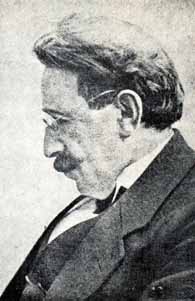David Frischmann

David Frischmann (also David Frishman ; * 1859 in Zgierz , Russian Empire ; † August 4, 1922 in Berlin ) was a Jewish writer , poet , essayist , literary critic and translator of beautiful literature , who wrote primarily in Hebrew .
Life
Frischmann came from a wealthy Jewish family in the central Polish industrial city of Zgierz and attended school at the synagogue , where he learned Hebrew, and then the municipal secondary school , where he studied humanities and the German language. Between 1890 and 1895 he was enrolled at the University of Breslau , where he attended seminars in philology , philosophy and art history and was friends with Micha Josef Berdyczewski . From 1895 to 1910 he lived in Warsaw , where he mainly worked as a translator of German, Russian and English literature into Hebrew. At the same time he worked as a Yiddish journalist for the Warsaw Jewish newspapers Hoys-Fraynd , Der Yud , Fraynd and a Łódź magazine. In 1911 and 1912 he visited Palestine ; The impressions gathered there contributed to his beginning to believe in the future of Hebrew as an everyday, not just religious, language, although his writing remained true to classical Biblical Hebrew throughout his life.
In July 1914, Frischmann stayed in Berlin and was interned as an enemy (Russian) subject after the outbreak of World War I. After a few months he was allowed to return to Poland; he went back to Warsaw and when the German troops advanced in 1915 he was deported to Odessa (his many German contacts made him suspicious in the eyes of the Russian authorities). In Odessa he worked for the Yiddish magazine Undzer Lebn , where he created his most beautiful poetry and masterful translations of the works of Rabindranath Tagore , Goethe , Heine , Byron , Oscar Wilde and Anatole France during the two years until 1917 . After the February Revolution of 1917 , he moved to Moscow , where he became chairman of the board of the large Jewish publishing house AJ Stybel . Here he continued his literary and translation work. In 1919 the publishing house was closed by the Bolsheviks and re-established in Warsaw. Frischmann continued to work here as the main editor in charge and carried out journalistic activities with his Neue Briefe concerning literature . His last work was the translation of Coriolanus by Shakespeare into Hebrew, which was published posthumously.
Seriously ill, Frischmann went to Berlin in 1922 for treatment, died there and was buried there.
Literary activity
David Frischmann made his debut as a 15-year-old boy with a translation of Don Ramiro by Heinrich Heine into Hebrew, a short story and some satires in Warsaw Jewish magazines and was already known in 1874 as a “shining star that rose on our literary sky - alongside Heine and Börne in German Frischmann in Hebrew ”celebrated. In the 1880s, Frischmann wrote several collections of novellas and short stories, which mainly dealt with the problem of outsiders: The protagonists are Jews who break with the manners and customs of Jewish society and are thereby cast out or perish (e.g. a famous rabbi who is a passionate smoker, thereby breaking the Sabbath laws and being excommunicated). Frischmann's sympathy always belongs to these weak and outcasts. He wrote not only in Hebrew and Yiddish, but also in German (many short stories in the Leipzig magazine Salon , 1885).
As a literary critic, Frischmann often had a scourging tongue, especially in the collection of essays Tohu va-Vohu in 1883, where he ridiculed the Hebrew literary journalism of his time because of its incompetence and provincialism. He also worked as a publicist and published, among other things, an eulogy on Theodor Herzl and an enthusiastic review of the diaries of Ferdinand Lassalle and the letters of Rosa Luxemburg .
As a translator, Frischmann created linguistically masterful translations of, among others, the children's fairy tales by Hans Christian Andersen , selected poems by Alexander Puschkin , Cain by Byron and Also sprach Zarathustra by Friedrich Nietzsche , and, at the end of his life, the poems by Rabindranath Tagore.
As a publisher and editor of literary magazines, he was mainly active from around 1900, in Vilnius with the daily Ha-Zeman and in Warsaw with Ha-Boker , finally, as mentioned above, in Moscow and at the end of his life again in Warsaw.
Works
- Ketavim Nivharim (Selected Works in Hebrew), 1–4, Warsaw and Petrikau 1899–1905;
- Kol Kitvei David Frischmann u-Mivhar Tirgumav , (Collected Works (Hebrew) and a selection of his articles), 1–16, Warsaw 1922;
- Works (in Yiddish), 1–4, Łódź 1909;
- Tirgumim , (Collected Translations), Jerusalem 1954.
literature
- Moshe Frydman: David Frischmann. Warsaw 1927.
- John F. Oppenheimer (Red.) And a .: Lexicon of Judaism. 2nd Edition. Bertelsmann Lexikon Verlag, Gütersloh u. a. 1971, ISBN 3-570-05964-2 , col. 225.
- Frischmann, David. In: Encyclopaedia Judaica . 1972, Vol. 7, Col. 198-203.
- Danielle Drori: A Translator against Translation: David Frishman and the Centrality of Translation in Early 20th-Century Hebrew Literature and Jewish National Politics . In: PaRDeS. Journal of the Association for Jewish Studies, issue 25, 2019.
Web links
- Literature by and about David Frischmann in the catalog of the German National Library
- The Institute for the Translation of Hebrew Literature
- Entry about David Frischmann in the Bio-Bibliographical Lexicon of New Hebrew Literature (Hebrew)
| personal data | |
|---|---|
| SURNAME | Frischmann, David |
| BRIEF DESCRIPTION | writer |
| DATE OF BIRTH | 1859 |
| PLACE OF BIRTH | Zgierz |
| DATE OF DEATH | 4th August 1922 |
| Place of death | Berlin |
